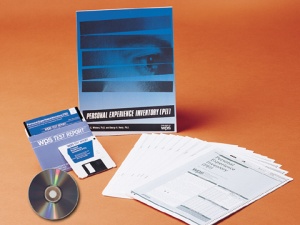by Ken C. Winters, Ph.D. and George A. Henly, Ph.D. | |
 | |

Personal Experience Screening Questionnaire (PESQ) Personal Experience Inventory for Adults (PEI-A) Assessment of Adolescent Alcohol and Drug Abuse: A Handbook Cigarette Use Questionnaire (CUQ) The PEI helps you identify, refer, and treat teenagers with drug and alcohol problems. It is particularly useful because it covers all forms of substance abuse, assesses both chemical involvement and related psychosocial problems, and documents the need for treatment. This convenient self-report inventory, used with more than 100,000 adolescents in facilities throughout the country, documents chemical involvement in 12- to 18-year-olds and identifies personal risk factors that may precipitate or sustain substance abuse. Problem Severity Scales | Drug Use, Frequency, Duration, and Age of Onset | |||||
Personal Involvement With Chemicals | Alcohol | |||||
Effects From Drug Use | Amphetamines | |||||
Social Benefits of Drug Use | Marijuana or Hashish | |||||
Personal Consequences of Drug Use | Quaaludes | |||||
Polydrug Use | Barbiturates | |||||
Transituational Drug Use | LSD | |||||
Psychological Benefits of Drug Use | Other Psychedelics | |||||
Social-Recreational Drug Use | Tranquilizers | |||||
Preoccupation With Drugs | Cocaine/Crack | |||||
Loss of Control | Inhalants | |||||
Heroin | ||||||
Psychosocial Scales | Other Opiates | |||||
Negative Self-Image | ||||||
Psychological Disturbance | Problem Screens | |||||
Social Isolation | Family Chemical Dependency | |||||
Uncontrolled | Sexual Abuse | |||||
Rejecting Convention | Physical Abuse | |||||
Deviant Behavior | Eating Disorder | |||||
Absence of Goals | Suicide Potential | |||||
Spiritual Isolation | Psychiatric Referral | |||||
Peer Chemical Involvement | ||||||
Sibling Chemical Use | ||||||
Sibling Chemical Use | ||||||
Family Pathology | ||||||
In addition, five validity scales alert you to response distortion, including defensiveness, “faking bad,” and inattentive responding. Norms, based on nearly 2,000 adolescents, are provided by age and sex for both drug clinic populations and regular high school samples. So you can see where the teenager stands in relation not only to the most extreme cases but also to average adolescents.
The entire inventory can be completed in just 45 minutes. It is then computer scored–using WPS TEST REPORT Mail-In Answer Sheets, the PEI CD, or FAX Service. All of these scoring options provide a complete interpretive report.
The PEI is routinely used in substance abuse treatment programs, student assistance programs, juvenile rehabilitation centers, and private practice. Reinforcing the trend toward earlier intervention, the PEI makes it easier to evaluate the many adolescents who are entering the health care system at younger ages, with more poorly defined problems. It permits more specialized treatment. And it documents the need for treatment–for insurance companies, the juvenile justice system, and parents
Component
KIT FOR MAIL-IN COMPUTER SCORING: Includes 5 WPS TEST REPORT prepaid PEI Mail-In Answer Booklets for computer scoring and interpretation; 1 Manual


